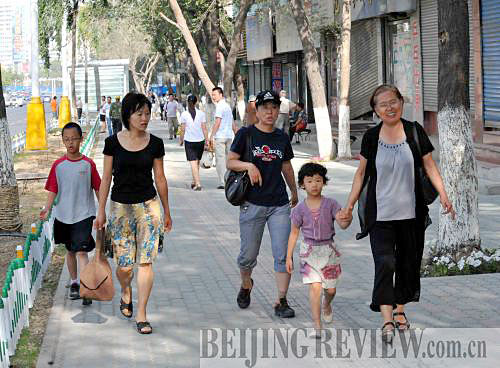|
 |
|
Parents take their children to a park in Urumqi, capital of northwest China's Xinjiang Uygur Autonomous Region, on July 8 (XINHUA) |
Urumqi appeared to be calm under heavy paramilitary police presence Wednesday after an overnight traffic curfew, but sporadic standoff and even minor clashes were still reported in the morning.
Although the so-called "comprehensive traffic curfew" has ended, traffic restrictions are imposed in some major streets, with armed police guarding or patrolling. Armored Personnel Carriers stood by.
More people appeared in the streets than yesterday, but Xinhua reporters saw less traffic in the morning, and even fewer buses.
Urumqi has about 1,000 buses in total, among which 190 were damaged or torched in the riot that began Sunday night, which has killed 156, and injured 1,080.
During half an hour from 9:30 to 10 a.m. Wednesday, only one No. 14 bus traveled Guangming Road with about 10 passengers on board. Normally, the fully-loaded No. 14 buses pass the street every five minutes in the morning.
Urumqi Airport is crowded with people anxious to leave. Those who are not able to get a handy ticket have swarmed nearby hotels. "We fear Xinjiang is not safe anymore," said a passenger who refused to be named.
In this capital city, women hustled to store extra groceries in the house and some office workers given a day off.
At a roadside morning market where 50 armed police were patrolling, at least one-third of the stalls were empty.
Prices of the vegetables were generally two- to- three times higher than before. A kilogram of haricot bean, previously two yuan, was sold at six yuan, while potatoes, originally 1.5 yuan, soared to 3.5 yuan per kilogram.
But woman who gave her name as Niu still chose to buy a lot to store at home so that she wouldn't have to go out frequently. "Vegetables could be more expensive tomorrow," she said.
Many neighborhood stores were closed, whose owners said they their food and bottled water were sold out.
Many people stayed at home instead of going to work on Wednesday.
Su Can, 27, works in an airlines company. She and her colleagues take turns to stay at home.
"I don't want to go out and my friends said that we could just make phone calls to each other."
Li Gang, a local resident, said his company gave them a day off and asked them not to leave their houses.
"I know from the news report that many rioters were arrested," he said.
"Now that the streets are guarded and helicopters are hovering, I think the social order could be restored."
(Xinhua News Agency July 8, 2009) | 